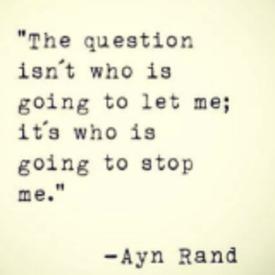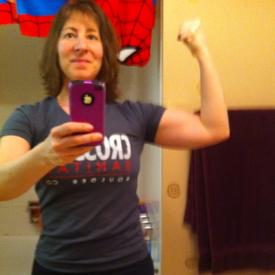I would suggest everyone to read Alan Aragon's latest blog h
Replies
-
what is this?! A knowledgeable post on MFP forums that doesn't start a **** fight with nutritional myths being thrown around all the place?!
+rep 0
0 -
Bump0
-
Thanks.... saving to read later.0
-
love any article that debunks the carb myth!! :bigsmile:
ME TOO!!
Bread Eaters-UNITE!
Um... since when does fruit = bread? Not in my world.0 -
Bump - everyone should read this.0
-
Bump0
-
Bump to finish reading later0
-
I can also guarantee the group that consumed 43% of the total calories as sucrose (table sugar) felt awful in doing so, but numbers and math never lie. I also don't see where bread was mentioned though as a source of carbohydrate, only fruit, unless that is categorized under the sucrose label. Can someone enlighten me
The referenced study on sucrose did include behaviour and there wasn't a statistically significant difference between the two high carb diets (Table 7, reference below).
The article didn't debunk anything about carbs that I could see, the sucrose study was a comparison of two high carbohydrate diets where it was the sucrose content that was varied, not the carb content - which was over 70% of calories in both cases (eek) http://www.ajcn.org/content/65/4/908.full.pdf+html0 -
Bump for later0
-
I can also guarantee the group that consumed 43% of the total calories as sucrose (table sugar) felt awful in doing so, but numbers and math never lie. I also don't see where bread was mentioned though as a source of carbohydrate, only fruit, unless that is categorized under the sucrose label. Can someone enlighten me
The referenced study on sucrose did include behaviour and there wasn't a statistically significant difference between the two high carb diets (Table 7, reference below).
The article didn't debunk anything about carbs that I could see, the sucrose study was a comparison of two high carbohydrate diets where it was the sucrose content that was varied, not the carb content - which was over 70% of calories in both cases (eek) http://www.ajcn.org/content/65/4/908.full.pdf+html
Thank you, I didn't see that part about behavior. I also came to the same conclusion you did, so all this hurray bread cheering has me scratching my head...0 -
I'm not sure why there's such a fan-fest for this article. Here are my takeaways.
1. no clear definition of "eating clean", and not all processed foods are bad.
I agree... the article mentioned that protein drinks and supplements are highly processed, and yet can be healthy. That makes sense to me, but it also makes sense that highly processed junk food is generally bad for you, with lots of unnecessary chemicals to make it shelf-stable and taste palatable while being made of low-quality and cheap products. I once sat on a plane next to a guy that was a rep for corn products. He pointed out to me the lovely "baked" look of the airport sandwich I had purchased, and said the corn-based product that he sells is what gives the bread that nice glow. He also pointed to all the ingredients on my sandwich label (turkey and cheese on wheat) and told me which were pseudonyms for corn. Uh, yeah, yuck. Bake your own bread out of a short list of ingredients... great (if your gut can handle it). Buy mass-produced Wonderbread? No thanks. Make your own burger out of... meat? Yes. Buy a burger from BK... delish and addictive, but there's more to that burger than meat. Look at the ingredient list on a bag of frozen Italian meatballs. Scary.
2. This author is a bit on the nutty side, IMHO. Note this sentence: "Fruits and vegetables have always been a mainstay of clean eating, but pesticide-free produce is now somehow cleaner, pests and all."
Ok, I almost stopped reading the article after this sentence. Is he serious? I mean, is he arguing that it's better to eat pesticide-laden produce? And pesticide-free produce does not generally mean I'm eating the vegetable with bugs, although if I did, it probably would be an excellent source of additional protein. I call BS on that, and will happily let this author consume lots of Roundup-laden veggies from Montsanto-enslaved farmers while I eat my pestiful "clean" ones from the organic farm down the street.
3. Don't use a GPS to go to the gym or you'll be scorned. "It emphasizes a prehistoric model, yet many of its proponents take an array of cutting-edge nutritional supplements, and use satellite technology to navigate their drive to the closest parking spot at the gym."
I love this passive aggressive sentence. I wish someone would print this out and hang it up, so I could submit it to http://www.passiveaggressivenotes.com/ (great site, btw). I get it. We can't eat exactly how paleolithic people ate, because no one knows what that was exactly, it varied based on geography, and the animals now are different than the animals then. But as Mark Sisson (I think) writes, it's not about a historical reenactment of the past. It's about doing your best to eat healthy foods that are SIMILAR to foods our ancestors (and great-grandparents) ate. My paraphrasing. I have no idea what my great grandparents ate... probably lots of root vegetables and chicken.
4. Body-builders are vitamin-D deficient (especially women) and should drink more milk.
Sounds good. I like milk, although I can ONLY drink milk delivered in a glass bottle from my local dairy, or else I'm running to the bathroom within 20 minutes. I think because it's only pasteurized, and not "ultra-pasteurized". I haven't tried drinking raw although that would be an interesting test of my theory. Many people following a strict paleo or vegan diet eliminate milk (for different reasons). I say... take a multi-vitamin and some extra calcium + D. I should take my own advice. I hate swallowing pills, and I used to be a drug rep! I'm hoping that if I lose weight and keep it off, I'll never need the statins and ARBs that I used to peddle. I do wholeheartedly encourage the HPV vaccine I used to sell. I digress.
5. Whey is processed but good for you, and even better source of protein than beef, eggs, milk, or soy.
Very interesting. I'm not a big protein powder girl, but for those who use it to add protein or as meal replacement... sounds like a good idea.
6. Cutting sucrose does not help weight loss. From the Surwit study:
A high take of sucrose from a low-fat, hypoenergetic diet did not adversely affect weight loss or other metabolic indexes when compared with an isoenergetic diet in which sucrose was replaced by starches and aspartame. Both diet groups showed equal significant reductions in weight, percentage body fat, REE, urinary norepinephrine and FT3 as well as an equal increase in FT4, suggesting that the metabolic effects of these diets were similar. No behavior sequelae accompanying high intakes of sucrose. The study failed to find any adverse metabolic or behavioral effects of high sucrose consumption in a low-fat, weight-loss diet.
Reviewer Comments:
Greater drop-out rates among the high sucrose diet group
Dietary program only 6 weeks long
Ok, but they replaced sucrose with starches and aspartame. So perhaps the body had the same insulin response to the starches (aka sugar) and aspartame? I don't know... just wondering. Also, I find it interesting that there was a greater drop-out rate of the high sucrose group, but this was a small study, so that's probably moot. And, the study only lasted 6 weeks. Still, an interesting study. My N=1 study of myself... when I cut back on sugars, I crave sugars less. Before, I was eating 2-8 Oreos after dinner every night. When I started my "primal" lifestyle, I read that dark chocolate was A-OK. I went out a bought a bunch. I find now that I'm almost never in the mood for them, and a nice sweet peach or a handful of berries is plenty satisfying.
7. Janeil is hot, but must get rope burns. I have no idea what her picture is doing in the article. Does she eat "clean"? Or not? Again, this makes me question the author. Not his taste in women, just... why? Maybe he put her picture there in the part of the article dense in scientific study jargon to keep people interested?
8. Flexible dieting is better than all-or-nothing diets and very restrictive diets. I didn't read the research, but I believe that must be true for most people. Psychologically, I assume it is harder to restrict, and the behavior can become obsessive. Personally, I'm not great at eating a well-balanced flexible diet. I tend to overeat. For me, it's easier to eliminate the foods that I tend to overeat when I'm in weight loss mode. Where I used to put the rice/pasta/beans/bread on my plate and then take 2nds and 3rds even though I was full, I now replace with vegetables. I think eating a mix of veggies, fruits, meat and nuts is pretty varied and balanced. I just find, for me, when it comes to grains it's easier to say "I don't eat that" than to say "only a little bit". I equate this a bit to alcoholism, which I have survived as a co-dependent. The alcoholic in my life can not just moderate his drinking. There is no such thing as one drink. And incidentally, now that he's eliminated alcohol, his sweet tooth is insane... I think his body still craves the sugar. Anyway, with about 1000% less intensity in terms of addiction or consequence, I feel the same way about my relationship with rice and pasta. I'm better at saying no, than at only taking one true serving.
9. 80-90% "clean" eating is good enough. Right on! In my very unscientific anecdotal observations of my friends on paleo/primal, and I'm assuming the same for those on other diets or eating lifestyles... that's how most of us operate. We slip. We indulge a meal or three. We make exceptions. That's the 10-20%. I eat according to the primal blueprint. Do I go crazy if there's soy in a sauce at a restaurant? No. Do I get the occasional chocolate/peanut butter kids' size ice cream from the local place? Hell yes. Do I eat a steak that wasn't grass-fed? Yes, but I'd prefer one that was. And, for the record, that sundae in the article looks incredible and looks like it should feel five people.
10. I haven't read anything else by this author, but this article was "meh".0
This discussion has been closed.
Categories
- All Categories
- 1.4M Health, Wellness and Goals
- 398.1K Introduce Yourself
- 44.7K Getting Started
- 261K Health and Weight Loss
- 176.4K Food and Nutrition
- 47.7K Recipes
- 233K Fitness and Exercise
- 462 Sleep, Mindfulness and Overall Wellness
- 6.5K Goal: Maintaining Weight
- 8.7K Goal: Gaining Weight and Body Building
- 153.5K Motivation and Support
- 8.4K Challenges
- 1.4K Debate Club
- 96.5K Chit-Chat
- 2.6K Fun and Games
- 4.8K MyFitnessPal Information
- 12 News and Announcements
- 21 MyFitnessPal Academy
- 1.5K Feature Suggestions and Ideas
- 3.2K MyFitnessPal Tech Support Questions










